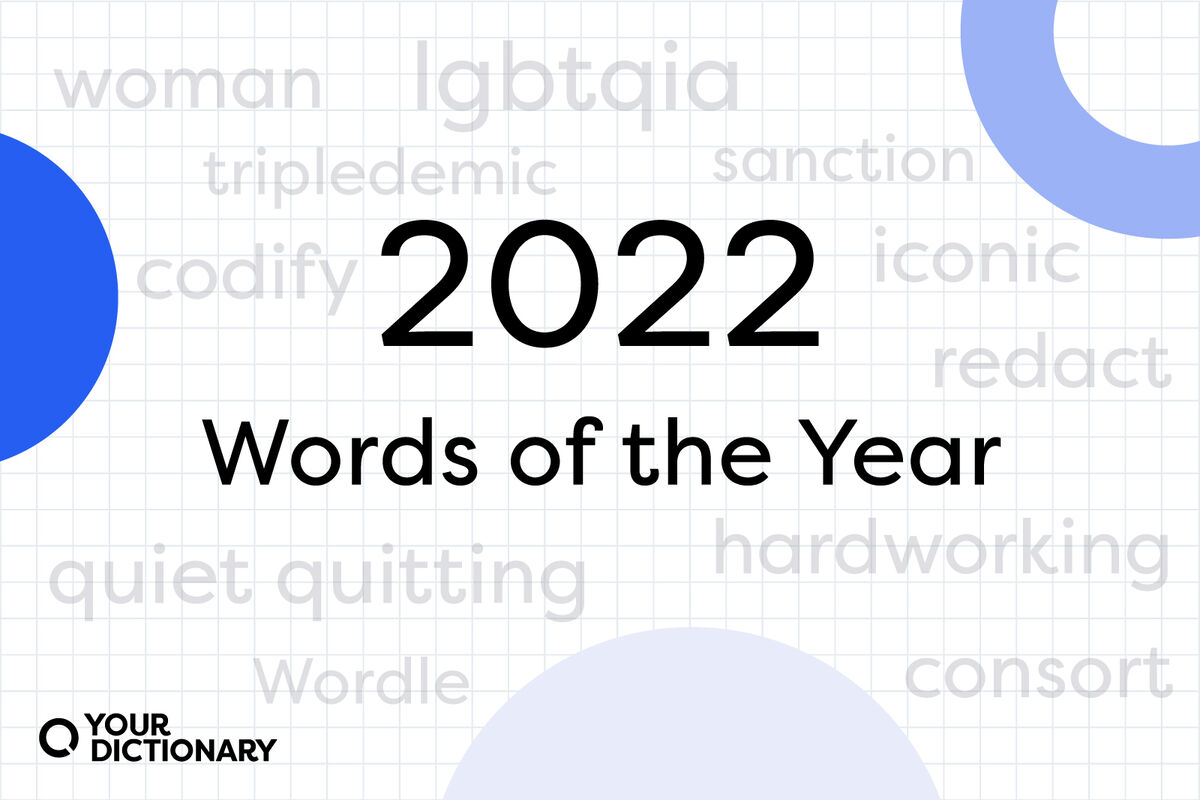
As bona fide word nerds, everyone here at YourDictionary has an opinion on what the coveted “word of the year” should be. The term has been used far and wide to refer to the one word or phrase that has gained significant popularity and/or relevance during the year. Some stay strong past the year they were crowned; others fade into obscurity as quickly as they rose into the limelight.
In 2022, several topical words and phrases made YourDictionary’s shortlist. From political turmoil, to the scrutiny of work ethic, to the very definition of identity, the terms that made the most impact this year definitely could have been narrowed down to one — but we’ve never been much about following the crowd.
With the help of our in-house data nerds, YourDictionary is excited to bring you a list of ten words that not only roused the most international interest, but continuously found themselves at the center of important and valuable conversations.
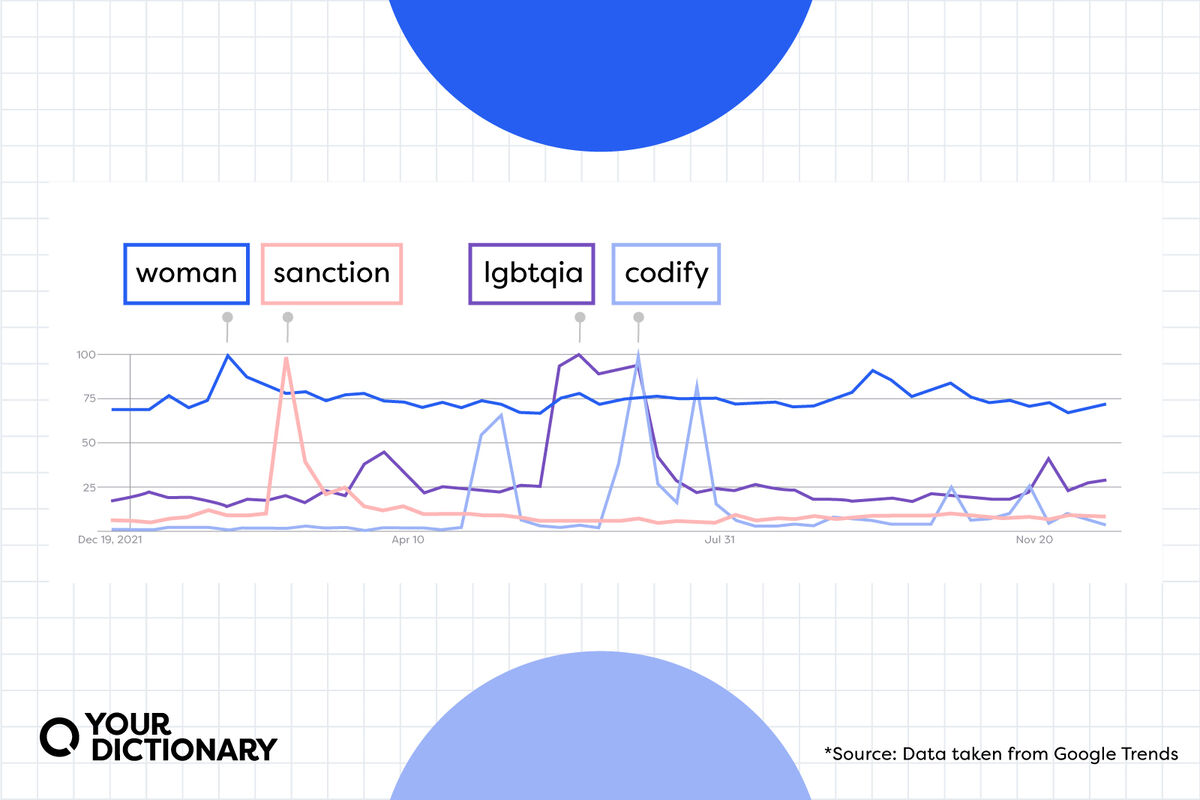
sanction [ săngkshən ]
noun. A penalty, specified or in the form of moral pressure, that acts to ensure compliance with a social standard or norm.
In February of 2022, the world looked on in shock as President Vladimir Putin announced his intentions to launch a “special military operation” in Ukraine. This marked the beginning of an internationally-condemned full-scale Russian invasion on its neighbor. The unprecedented nature of this invasion, and to some extent the effect of public outrage, led to several countries both imposing new sanctions and ramping up existing ones against Russia.
In the same month, YourDictionary saw an increase in clicks to sanction in our dictionary, and an overall heightened search volume of the term across the internet. The contronym had its moment in the spotlight this year as people from all around the world attempted to understand what actions the United States, the European Union, and other countries were taking to condemn Russia’s invasion of Ukraine.
Despite the solemn basis for its climb to notoriety in 2022, sanction’s popularity coincides with other acts of public support for Ukraine, including the trending use of Twitter hashtag #StandWithUkraine and the emoji of the country’s flag 🇺🇦. It's an indication that, even through political turmoil, there remains power in language (and the evolution thereof).
woman [ wo͝omən ]
noun. An adult female human being.
In March of 2022, those tuned into the Supreme Court confirmation hearing of Judge Ketanji Brown Jackson watched with bated breath as Senator Marsha Blackburn posed what, to many, would later become the biggest question of the year: “Can you provide a definition for the word woman?”
In direct response to that question, our site experienced the largest increase in clicks and search volume we've ever seen for the word woman. But the uptick in interest didn’t stop there. Woman, a word that has roots in Old English and means “female person,” rose up again with the Supreme Court’s ruling on Dobbs v. Jackson Women’s Health Organization, which officially overturned the 1973 Roe v. Wade ruling — a ruling that had long-since been hailed as a victory for women’s rights.
The word woman has featured in other vital moments throughout the year, like the ongoing women-led protests in Iran sparked by the death of Mahsa Amini in September or the related spike in popularity of the term TERF in association with author J.K. Rowling. Cambridge Dictionary also recently updated their definition of the word to include “an adult who lives and identifies as female though they may have been said to have a different sex at birth.” As one of the most common nouns in the English language, and with moments like these throughout the year, woman remains of constant interest to the public.
codify [ kŏdĭ-fī ]
verb. To turn (a common law requirement or practice) into law.
As mentioned above, in June of 2022, the Supreme Court decided to overturn Roe v. Wade, the 1973 landmark decision that struck down a Texas statute that banned abortion. The original decision had made it clear that laws banning abortions outright were unconstitutional. Thus, its overturn sparked outrage and fear among many about the possibility of new state laws that would make it impossible for women to obtain safe abortions.
So where does codify come in? Well, let’s rewind to a month prior. In May, the word codify saw a significant spike in search volume across the internet (including to our dictionary entry). This was likely a result of democrats in the Senate announcing their attempt to codify Roe v. Wade in response to the leaked decision by the Supreme Court to overturn it. People across the nation brought codify, a word originating circa the 1300s from Old French and Latin, to the front and center in an attempt to understand the government’s next move.
It also saw a resurgence this December, with the decision to enact the Respect for Marriage Act — an act that codifies federal recognition of same-sex marriage — into law. Along with the ongoing public outcry over the Supreme Court’s decision to overturn Roe v. Wade, codify remains a relevant and topical word.
LGBTQIA+
abbreviation. Initialism of lesbian, gay, bisexual, transgender, queer/questioning, intersex, and asexual.
Sexual and gender identity have been heavily-discussed topics for the past, oh, couple of decades, maybe? But this year our article on the term LGBTQIA+ surged an impressive 276% up from just last year. One could chalk this up to a seasonal effect — June marks the annual celebration of Pride Month, a celebration of the history and culture of the LGBTQIA+ community. But several events and historic decisions factored into the uptick of interest for the abbreviation.
Despite the decades’ worth of history behind the abbreviation (stemming from the first iteration of it, “LGB,” in the mid 1980s), the community’s fight against prejudice remains ongoing. From the defiant show of solidarity in World Cup matches by international football players in Qatar (where homosexuality is illegal) to the devastating shooting at an LGBTQIA+ nightclub in Colorado Springs, the LGBTQIA+ community continuously proves the struggle for their basic human rights and acceptance is far from over, making it an evergreen topical term.
And although just earlier this month the Respect for Marriage Act was signed into law, bringing the term into the limelight once again, many in the LGBTQIA+ community believe this is a small step towards a much bigger, yet almost laughably sensible, goal: To live a life free of hateful prejudice.
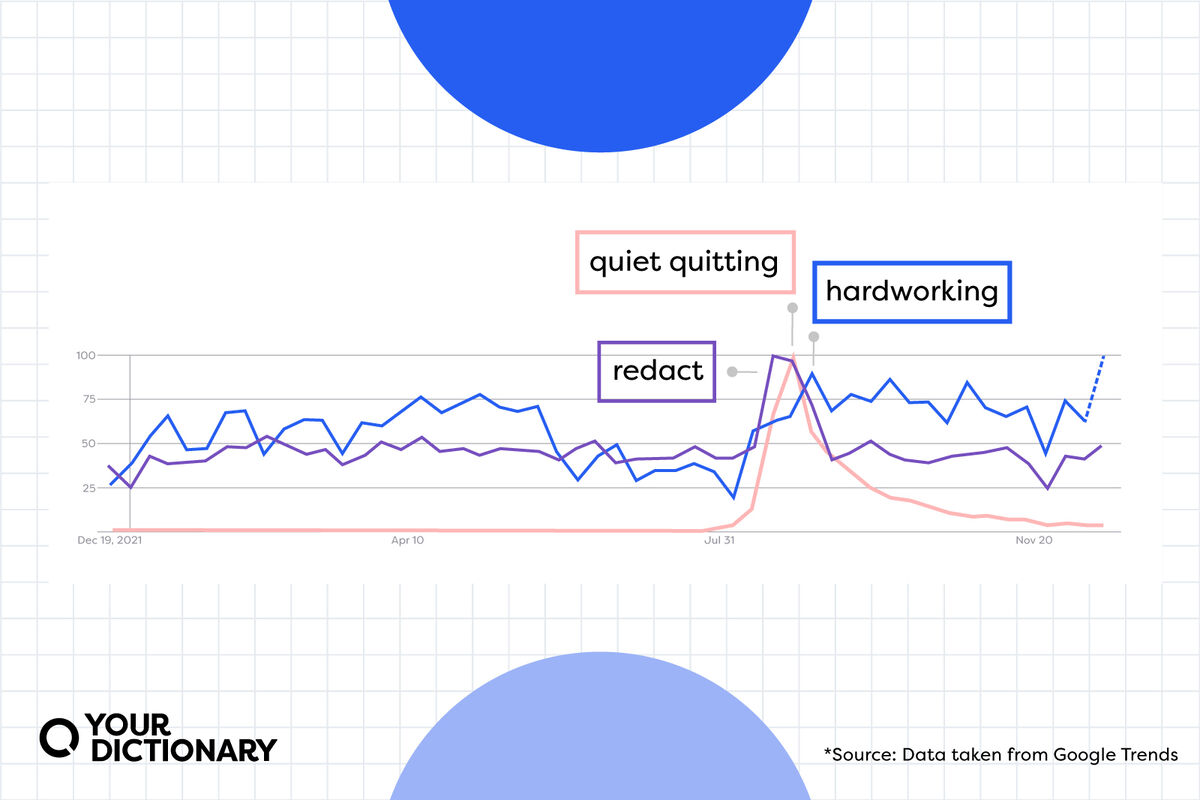
redact [ rĭ-dăkt ]
verb. To censor, used by a government when parts of a document are kept secret and the remainder released.
In early August of 2022, FBI agents executed a search on Mar-a-Lago, Donald J. Trump’s 20-acre private club and now-residence. The nation watched on with (unsurprisingly) mixed feelings and opinions. Despite both favorable and unfavorable outcries, the FBI searched and seized 15 boxes of material related to Trump’s criminal investigations.
Thus began the internet’s own widespread search that prompted an uptick in clicks to our site for the word redact (or specifically, redacted). Why? We wager it’s because later that same month, the Trump Mar-a-Lago affidavit was unsealed and released to the public. That document was among the most heavily redacted ones the public had ever been privy to.
The word redact comes from the Latin word redactus, which means “to draw back” or “to withdraw.” It’s been used in the English language since the early 17th century, but became a heavy topic of debate and conversation in August. Despite this, its time in the limelight was short-lived, and though we don’t think this one will make it past 2022 with the same notoriety, who knows? We may not be working with all the information.
quiet quitting [ kwīĭt kwĭtiŋ ]
verb. Doing the tasks involved with your assigned role at work, no more, no less; doing your job without your job taking over your entire life.
In March of 2022, Dr. Justin Carrington tweeted a reply to an educator asking for opinions on the greatest leadership challenge we face today. In his tweet he used the term “quiet quitting,” citing it as an “era” in the wake of “burnout, poor leadership, limited autonomy, etc.” The tweet came and went, with only 12 likes and two interactions.
Later in July, TikTok user Zaid K posted a video on the term that quickly gained traction, and by August, the term spiked significantly in internet searches. The media picked up on it, Twitter battled over the connotations of it. Even our article on the term is up nearly 5,000% since its publication just this September, making it the fastest growing article on our site this year.
Though the concept of “quiet quitting” has roots in the Chinese trend tang ping (which promotes avoiding overwork and living a happy, healthy life), the term has taken on a life of its own. We’ve watched (delightedly, might we add) as quiet quitting has evolved in real-time to reflect new connotations. It has turned from a controversial topic on acceptable work ethic to an encouraged way of life that promotes positive mental health and denounces “hustle culture.” It even has its own spinoff terms, like “quiet firing” and “quick quitting.” This leads us to our next term ...
hardworking [ härdwʉrkiŋ ]
adjective. A term used to describe a person or thing that is diligent or zealous at completing a task.
Around the same time that quiet quitting was making the trending rounds, another word snuck into the top searches on our thesaurus site. Hardworking made its debut possibly as quiet quitting’s evil stepsister, used commonly as a weapon against those promoting a healthy work/life balance. Well — hardworking and we’re sure its many synonyms, as we saw a spike of 125% to its thesaurus entry on our site from last year.
Whether it was the counterarguments for “quiet quitting” that involved accusations of laziness or a perceived lack of diligence in “quiet quitters,” something seemed to resonate with the naysayers. On the other hand, hardworking — a compound adjective that has roots in Old English — seemed to be a hot topic among “quiet quitters,” too. Many have insisted that quiet quitting has little to do with how hardworking a person is, and more to do with balancing a healthy lifestyle that promotes both physical and mental health: even if it means keeping work exclusive to ... work.
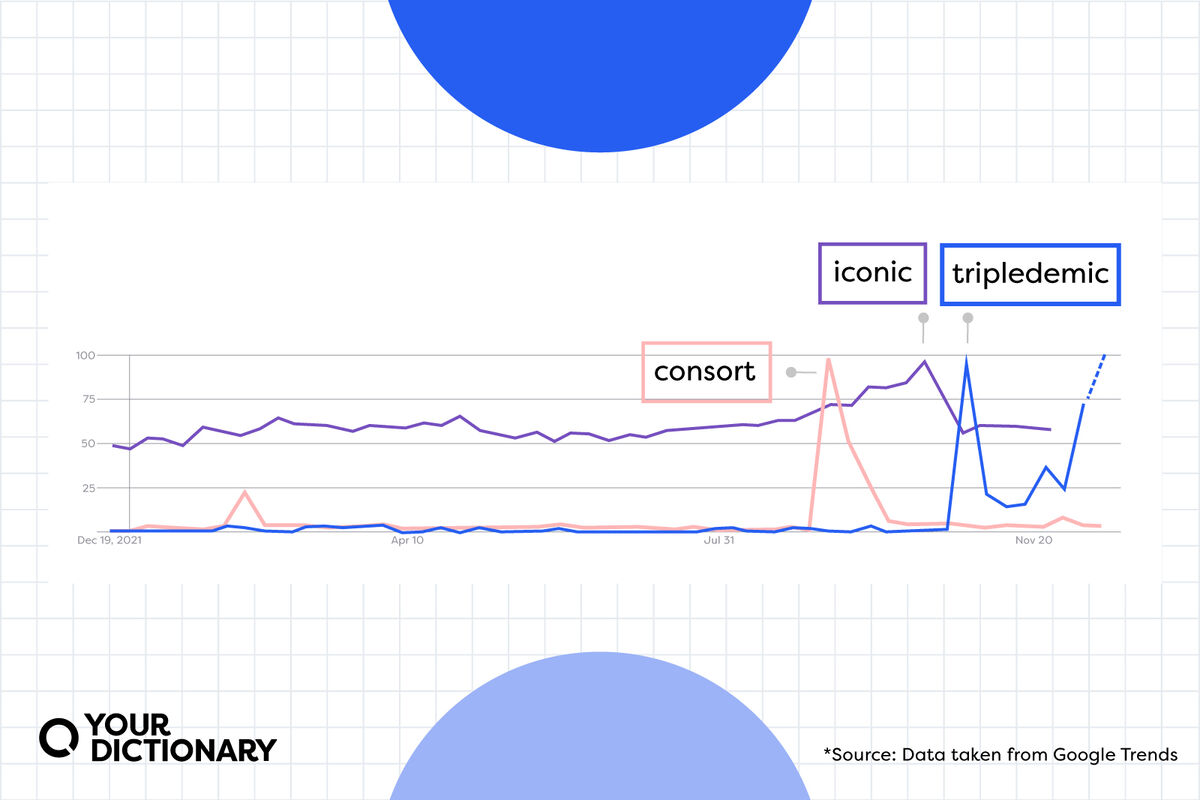
consort [ kŏnsôrt ]
noun. A wife or husband; spouse, esp. of a reigning king or queen.
In September of 2022, the world felt like it stopped in its tracks, if only for a moment. Queen Elizabeth II passed away at 96 years old, signaling the beginning of a country-wide period of mourning ... and a period of increased scrutiny of the British monarchy.
Almost immediately following the announcement of the Queen’s death, our article on the difference between a queen consort and a queen saw a significant rise in clicks. The interest, no doubt, was sparked by the proclamation of King Charles’s III ascension to the throne with queen consort Camilla Parker Bowles at his side. The term queen consort was used almost hourly during the coverage of Queen Elizabeth II’s death, marking a clear distinction between the late queen regnant and the heir King’s spouse.
The word consort comes from the Latin word consortem and the Old French consorte, both meaning “partner” or “wife.” Queen, with roots in Old English, originally referred to a woman of high rank. Together, queen consort clearly applies to the wife of a current monarch. Many discovered the term through the media’s coverage and mentions of Camilla Parker Bowles.
Queen consort is seeing another minor uptick in interest in the wake of Harry & Meghan, the Netflix docuseries that premiered earlier this December and brought the British monarchy under scrutiny once more. Clearly language remains an important player in modern royalty.
iconic [ ī-kŏnĭk ]
adjective. Of, or having the nature of, an icon.
Towards the end of October of 2022, our thesaurus site saw a peculiar interest in synonyms of iconic, a word with Greek origins and roots in religious context. Although originally used to describe images of sacred religious figures, iconic has evolved to mean something more broad. It has now become more popular as a slang term, often used by young people to describe something or someone that is particularly noteworthy or memorable.
Back to that uptick: Around the same time, Taylor Swift dropped her tenth studio album, Midnights. We don’t think her impact on popular culture can be overstated, and we had our own taste of her impact. Our article about the meaning of antihero had an immediate surge of clicks after the release of her recent album’s first single, "Anti-Hero."
Though the uptick was undeniably impressive, the term itself has been trending throughout the year, possibly in reference to some of the most noteworthy women of our time. Consider Serena Williams, who announced she was "evolving away from tennis" earlier this year, and Queen Elizabeth II, who, upon her death in September, earned the title of longest-reigning monarch in British history (70 whole years!).
In the end, we think it’s safe to say many public figures in this day and age rightfully deserve a status that is nothing short of iconic. Or awe-inspiring. Or emblematic. You get the idea.
tripledemic [ trĭpəl-dĕmĭk ]
noun. Referring to a collision of RSV (respiratory syncytial virus), flu, and COVID-19.
The year 2020 marked the beginning of the COVID-19 pandemic, which changed the world as we know it. Two years later, and there is no end in sight. Though many believe the pandemic to be over, the introduction of the term tripledemic makes a harsh truth clear: COVID-19 remains very much present in our daily lives.
The term, which sounds like something out of a science fiction novel, increased in search volume around the end of October, when experts around the United States warned it would be heading our way this winter season. With flu season on the horizon, COVID-19 cases predicted to rise again, and early signs of RSV, there’s no real mystery to why health officials chose tripledemic as the term to warn the masses.
Triple, which comes from the Latin word triplus, is derived from the prefix tri-, meaning “three.” Meanwhile, the suffix -demic is derived from the Greek word demos, which means “people” or “population.” Thus, a tripledemic implies a widespread outbreak of three different viruses. The term has seen another rise in search this month, with the viruses’ predicted rise coming to fruition, and, in an unfortunate turn of events, affecting mostly young children around the country.
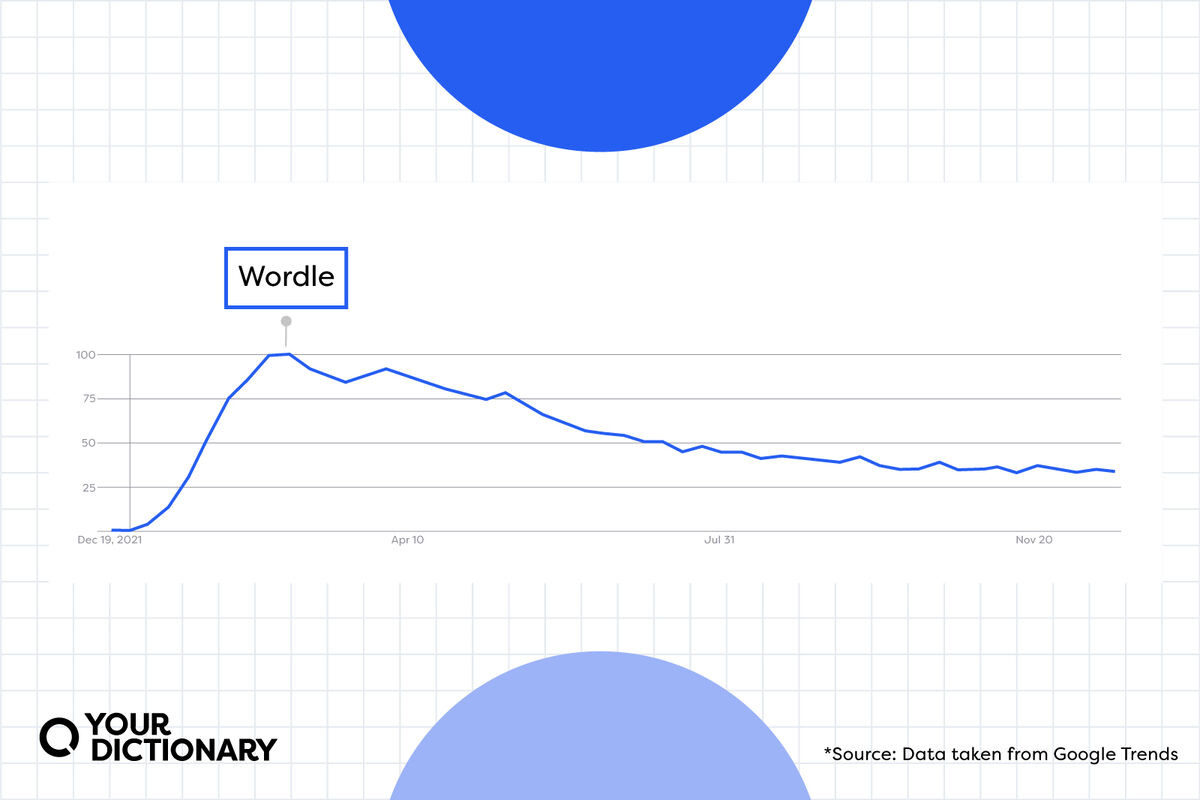
Bonus Word: Wordle [ wûrdl ]
noun. A daily online word game that challenges players to find five-letter words in no more than six guesses.
While we entered 2022 with COVID-19 "Scrabble" variants looming, tensions between Russia and Ukraine heightening, and TikTok trends encouraging people to put just about anything in an air fryer, green and yellow squares began taking over every social media platform. Wordle, the daily online word game created by Josh Wardle in June of 2021, challenged players from all around the world to guess the secret five-letter word of the day. The game skyrocketed into fame early 2022 and peaked in search volume around February of 2022, encouraging friendly competition, rants of frustration, and even creative expression.
According to our word game experts at WordFinder, Google Trends revealed that the search interest for Wordle increased by more than 5,000% just between January 2022 and February 2022.
The quick rise in popularity of the word game helped launch WordFinder’s Wordle solver tool plus their hints and answers pages, and also became a simple way for celebrities to relate to their fans in a seemingly organic way. For months, Wordle trended on Twitter, guest-starred in several panic-inducing dreams (though that may have been just us), and earned the attention of The New York Times, which announced its purchase of the game on January 31, 2022.
Much like any other viral game, Wordle wasn’t really expected to keep a steady upward trajectory. Though it certainly didn’t have its own “Pokémon GO to the polls” moment to indicate the beginning of its downfall, the steady decline of users indicated casual players of the game were ditching Wordle for whatever more interesting, celebrity-hyped trend was happening next.
But it’s not all negative! Just last month, WordFinder checked in with avid word gamers in the community to see if Wordle was, in fact, dead in the water. Surprisingly, 45% of the users they surveyed say they may play Wordle more now than they did in early 2022. Which just goes to show that in a year filled with ups and downs and the unexpected, anyone can find comfort in routine, including a daily online word game.